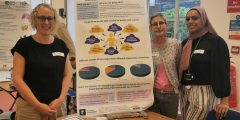Judging the Rapid Eczema Trials art competition
October 16, 2025
By Kate Henaghan-Sykes I had the privilege of judging the Rapid Eczema Trials Art Competition. Entrants were asked to create a piece of artwork around the themes of “Me and my eczema” or “My relationship with eczema”. This could take any form, a drawing, painting, poetry, or mixed media. Eczema affects millions of people worldwide, …
Online eczema trials – reducing the carbon footprint of research
September 8, 2025
By Vaibhav Chaganti and Emma Campbell Climate change is happening right now, all around us. Across the globe we’re seeing more intense heatwaves, stronger storms, record-breaking floods, prolonged droughts, and more frequent and severe wildfires. These changes are largely driven by human activities that release greenhouse gases into the atmosphere. Within Rapid Eczema Trials, we …
Prize-winning eczema research
August 1, 2025
By Kim Thomas and Laura Howells Over the last few months, we have spent a lot of time sharing the results of our Eczema Bathing Study. It has been great to hear what the findings mean to people with eczema. Our study found that how often you have a bath or shower makes no different …
Reflections on the Rapid Eczema Trials community – your voice
June 27, 2025
The Rapid Eczema Trials research project is spear-heading a new approach to running clinical trials in partnership with people with eczema. As part of our eczema community, you have helped us choose research questions that matter to you. Some of you have also then helped design and refine the clinical trials, both through surveys and …
The burden of eczema patients in Kenya
February 26, 2025
The following blog has been written by Rachel Ogola, President of the Eczema Society of Kenya and EUPATI Fellow. We are fortunate that Rachel sits on one of our Rapid Eczema Trials co-production groups. It’s invaluable to have someone like Rachel helping to develop messaging around our research that can resonate with the global eczema …
My journey into research as a person with eczema
January 24, 2025
I’d had enough of being stuck in limbo with my eczema. I felt like there was not enough educational material out there for people with eczema, and a lot of the questions I had about my condition remained unanswered by healthcare professionals. So, I googled ‘eczema trials’ to see what research was taking place in …
What an amazing year 2024 has been
December 16, 2024
As we come to the end of another year and look to the future in 2025, we just wanted to take a moment to reflect on the amazing things that the award-winning Rapid Eczema Trials project has achieved over the last year. You have all played a part in that – thank you! Our first …
Just one thing…
October 31, 2024
Last month (15-22 September) was National Eczema Week. This annual campaign aims to raise awareness about eczema – so of course the Rapid Eczema Trials team wanted to do our bit to mark the week and support such an important cause! We put our heads together and came up with the idea of making a …
Exploring community beliefs around clinical research
September 27, 2024
A wedding planner wouldn’t plan a wedding without input from the couple who are to be married… So why would anyone do health research without input from the populations that they’re hoping to help? Just like nearly weds will prefer certain arrangements over others, so will people find certain interventions more acceptable. And there’s no …
Talking eczema flare-ups
August 16, 2024
When studying something, we need to use words that everyone understands. That way, our findings make sense and can help people. Even common words like a “flare-up” in eczema can mean different things to different people. Everyone in the eczema world talks about “flare-ups” as a term for worsening of the eczema. But that is …










